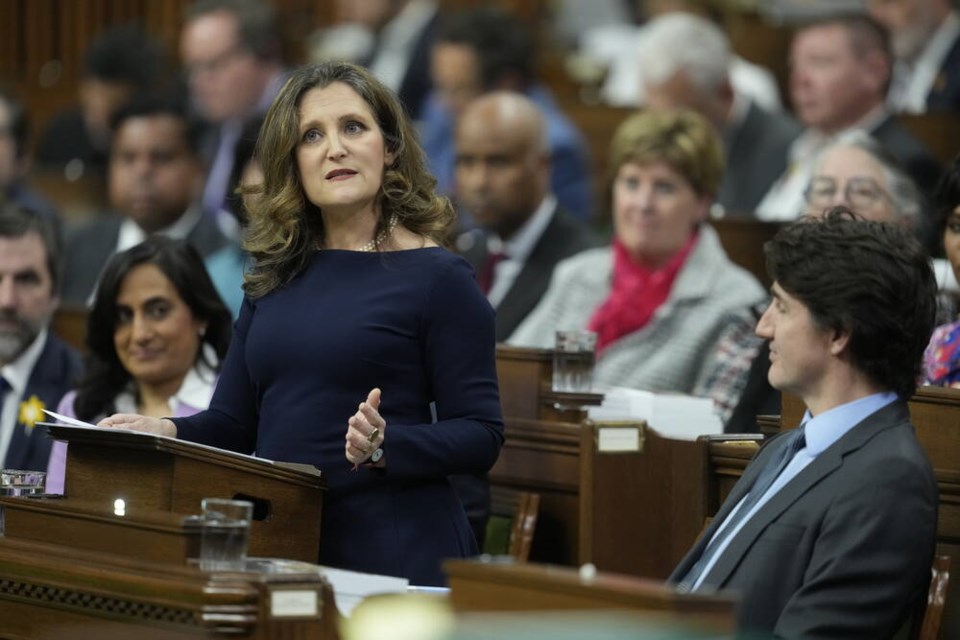The federal budget, unveiled Tuesday, took a big swing on housing, and analysts say many of the initiatives are borrowed from Premier David Eby’s housing agenda.
One of the initiatives — the Canada Rental Protection Fund — was announced by Prime Minister Justin Trudeau in the lead up to the budget and will use $1.5-billion in federal money to help non-profit organizations buy rental units across the country and ensure they remain affordable.
The program is almost a carbon copy of Eby’s $500-million rental protection fund, which was announced in January 2023 and was a key plank of Eby’s housing platform in the B.C. NDP leadership campaign.
The federal Liberals also released the Canada Builds plan, which eyes underutilized federal land, including Canada Post and National Defence properties, in order to achieve the goal of building 3.87 million new homes by 2031.
In February, Eby unveiled his long-awaited B.C. Builds plan, which will use $2 billion in low-cost government financing to speed up the construction of rental buildings on underused public, non-profit or private land. Eby estimated it could create at least 4,000 affordable units for middle-income British Columbians.
“I’ll give credit where credit is due. We actually have modelled Canada Builds on the B.C. Builds program,” Jonathan Wilkinson, a federal Liberal cabinet minister, told Postmedia News on Friday ahead of budget day. Wilkinson oversees the energy and natural resources file but has been involved in many of the Trudeau government’s pre-budget announcements rolling out the national housing strategy.
“We thought that there were a number of elements in B.C. Builds that were actually very useful and so we essentially took what Premier Eby has done and are looking to to use that across the country,” Wilkinson said. “The Eby government has been very engaged on the housing issue. They have been very collaborative in all of the conversations that we have had with them, and in fact, we have copied some of the programs that they have put in place.”
Andy Yan, an urban planner and director of Simon Fraser University’s City Program, said the federal budget is clearly influenced by Eby’s “audacious” housing platform.
“It really is one of those things where it doesn’t repeat itself but it rhymes,” he said in comparing Trudeau’s housing strategy to Eby’s.
It raises the question, Yan said, as to whether B.C. will get “first mover advantage” in the form of boosted financial support for housing initiatives that have been spearheaded in B.C. while the other provinces are still catching up.
The challenge for both the B.C. government and the federal government, Yan said, is how long it will take housing projects to go from policy announcement to physical reality.
Tom Davidoff, executive director of the Sauder School of Business’s Centre for Urban Economics and Real Estate at the University of B.C., said it’s notable that the federal government is topping up the Housing Accelerator Fund by $400 million, which he called “carrot and stick funding” that rewards cities, towns and Indigenous governments with housing cash as long as they agree to zoning reforms and higher density housing.
Since announcing the $4-billion fund in 2022, 15 B.C. communities have received funding. That’s out of 179 housing deals inked with communities across Canada.
“I think that [fund] has really moved the needle on municipal zoning throughout Canada which is quite important,” Davidoff said.
Davidoff said the Housing Accelerator Fund uses a similar approach as Eby’s Housing Supply Act, which rewards municipalities with cash for amenities if they meet provincially set targets for new housing starts.
Eby said the B.C. NDP government has already achieved the zoning reform Ottawa was demanding through a law passed last fall that forces municipalities to approve up to six units on a single family lot.
“British Columbia is already where [the federal government] wants the provinces to be,” Eby said, speaking about the federal housing cash during an unrelated press conference Tuesday morning. “We are prepared to accept all of the money from the other provinces that refuse the basic steps to ensure the availability of housing.”
Eby said he “welcomes the federal government coming to the table in a significant way on housing,” which he said is “overdue.”
— With files from The Canadian Press










